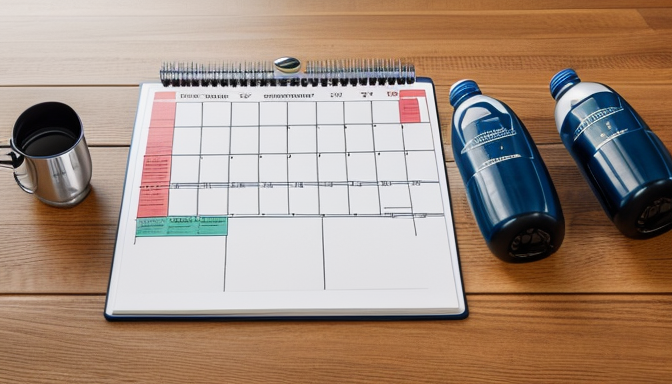This article provides essential tips and strategies to help you effectively prepare for your upcoming competition, ensuring you perform at your best and achieve your goals.
Establishing specific, measurable, achievable, relevant, and time-bound (SMART) goals is crucial for focused preparation and motivation throughout your training journey. Think of your goals as the north star guiding you through the vast ocean of competition. Without them, you might drift aimlessly, but with clear objectives, you can navigate your way to success. For instance, instead of saying, “I want to do well,” say, “I want to improve my time by 10 seconds in the next race.” This clarity will keep you motivated and on track.
Creating a structured training plan tailored to your competition will help you improve your skills, build endurance, and ensure you are physically and mentally ready on the day of the event. Imagine your training plan as a recipe: each ingredient is essential for creating a winning performance. Here’s what to include in your plan:
- Skill Development: Focus on the specific techniques required for your sport.
- Endurance Training: Incorporate long workouts to build stamina.
- Rest and Recovery: Don’t underestimate the power of rest days.
By following a well-thought-out plan, you’ll not only enhance your performance but also boost your confidence, making you feel like a champion even before the competition begins.
Lastly, make sure to get updates on local and international swimming competitions, races, and aquatic events happening around the world. This knowledge will keep you informed about the landscape of your sport and help you identify potential competition and trends. You can follow relevant websites, subscribe to newsletters, or join community groups. Remember, staying connected is key to staying ahead!
Setting Clear Goals
When it comes to preparing for your next big competition, is akin to charting a course on a map. Without a destination, you might find yourself lost in the vast sea of training and preparation. So, how do you ensure that your goals are not just vague wishes, but powerful motivators? The answer lies in the SMART criteria: Specific, Measurable, Achievable, Relevant, and Time-bound.
First off, think about what you want to achieve. Instead of saying, “I want to do well,” aim for something more concrete, like “I want to improve my time by 10 seconds.” This specificity gives you a clear target to aim for. Next, make sure your goals are measurable. You need to track your progress, so consider using a training journal or an app to log your workouts and improvements. This way, you can see how far you’ve come, which is incredibly motivating!
Now, let’s talk about achievability. Setting a goal that’s too lofty can lead to frustration. Instead, break it down into smaller milestones. For example, if your ultimate goal is to win a championship, set interim goals for each month leading up to it. These should be relevant to your overall objective and should challenge you without being impossible.
Lastly, don’t forget about the time aspect. Having a deadline creates urgency and keeps you focused. Consider creating a goal timeline to visualize your path:
| Goal | Deadline |
|---|---|
| Improve 100m time | 3 months |
| Complete a local competition | 6 months |
| Win the regional championship | 1 year |
By setting SMART goals, you’ll not only keep your motivation high but also make your competition preparation feel more like an exciting adventure rather than a daunting task!

Developing a Training Plan
When it comes to preparing for your next big competition, developing a solid training plan is like crafting a roadmap for your journey. Without it, you might find yourself lost in a sea of uncertainty, unsure of how to navigate the waters of competition. So, how do you create a plan that not only enhances your skills but also builds your endurance? Let’s dive in!
First off, it’s essential to assess your current skill level. This means taking a good, hard look at where you stand in relation to your goals. Are you aiming for a personal best, or are you looking to take home the gold? Depending on your answer, your training plan will vary. Consider setting aside time each week for specific drills that target your weaknesses. This could include technique work, speed sessions, or endurance training.
Next, consider your schedule. Life can get hectic, but consistency is key! A well-structured plan should include:
- Daily training sessions
- Rest days for recovery
- Nutrition and hydration strategies
Don’t forget to track your progress! Keeping a training log can help you stay accountable and motivated. Remember, the journey to competition is a marathon, not a sprint. By following a carefully designed training plan, you’re setting yourself up for success on the big day. So grab your goggles, and let’s make waves!
Frequently Asked Questions
- What are SMART goals and why are they important?
SMART goals stand for Specific, Measurable, Achievable, Relevant, and Time-bound. They are crucial because they provide a clear roadmap for your training, keeping you focused and motivated throughout your preparation.
- How do I create an effective training plan?
To create an effective training plan, start by assessing your current skill level and the specific requirements of your competition. Then, outline a schedule that includes various training activities, rest days, and milestones to track your progress.
- How can I stay motivated during my training?
Staying motivated can be tough! Try setting small, achievable milestones along the way, rewarding yourself when you reach them. Surround yourself with supportive friends or training partners who keep you accountable and inspired.
- What should I do the day before the competition?
On the day before your competition, focus on rest and relaxation. Avoid heavy training, hydrate well, and ensure you have a nutritious meal. Visualize your performance to boost your confidence and prepare mentally.